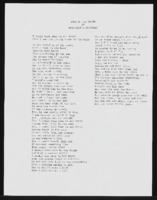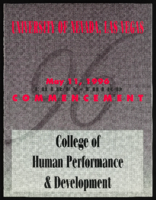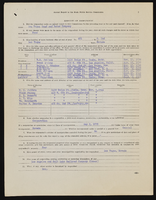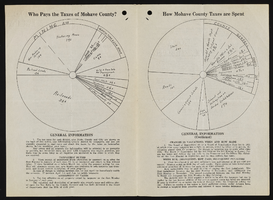Search the Special Collections and Archives Portal
Search Results

Francisco Rufino Parra interview, December 6, 2018: transcript
Date
Archival Collection
Description
Interviewed by Barbara Tabach. Born in Mexico, Francisco was a child when his father received permission to immigrate to the US with his younger children. Upon graduating from high school in California, he moved to Las Vegas where one of his sisters lived. It was 1994 and jobs were plentiful; he would find his way through several positions. Then in early 2000 he was hired to be a dishwasher, on the graveyard, at the recently opened Paris Hotel. It was a Culinary Union job; by 2002 he was a shop steward and finding better positions at Paris. He continues to work at the Paris Hotel as a fry cook. In 2008, he was a citizen and proudly voted in his first presidential election.
Text

Maria Moore interview, August 2, 2019: transcript
Date
Archival Collection
Description
Interviewed by Elsa Lopez. Born in Belize, Director of AARP, speaks English, Spanish and Creole. Specialist in senior affairs.
Text

Transcript of interview with Clark Crocker by Monica Lehman, March 3, 1978
Date
Archival Collection
Description
On March 3, 1978, Monica Lehman interviewed Clark Crocker (born 1920 in Westfield, Massachusetts) about his experiences while living in Nevada. Crocker first talks about his family and educational background before describing his experiences from going to school in both California and Massachusetts. Crocker then describes what he knows about the building of Hoover Dam and later talks about his career as a teacher and school principal. The two also discuss Crocker’s hobbies and volunteer work, including that for the fire department in Pahrump, and they later discuss Crocker’s experiences as both a frogman and navigator for the United States Navy during World War II. The interview concludes with some of Crocker’s thoughts and philosophies on how curriculum should be structured in schools.
Text

Irene Cepeda interview, April 24, 2019: transcript
Date
Description
Interviewed by Monserrath Hernández, Nathalie Martinez and Rodrigo Vázquez. Irene Cepeda is a woman dedicated to serving the Latinx as well as all minority groups in education in Southern Nevada. As a Las Vegas native, she grew up alongside the Latinx community here and is a proud Latina from Nicaraguan roots. She is dedicated to uplifting the Latinx community through her work with the Latino Youth Leadership Conference and college access specialist at Nevada State College. Now, as representative of District D on the Clark County School District Board of Trustees, she seeks to tackle the issues the district faces from acts of White supremacy to a lack of funding for English Language Learner families.
Text

Newspaper article, Pioneer Las Vegan Sees Town Grow, Las Vegas Sun, February 9, 1965
Date
Archival Collection
Description
Newspaper article featuring Lucretia Stevens. She moved to Las Vegas in 1923 when the town was about six blocks square and about 60 people made up the black community.
Text

"Home of the Brave": humorous poem by Roosevelt Fitzgerald
Date
Archival Collection
Description
From the Roosevelt Fitzgerald Professional Papers (MS-01082) -- Short stories and poems by Roosevelt Fitzgerald file.
Text

The Boulder Dam Las Vegas Rotary Club newsletter, September 30, 1926
Date
Archival Collection
Description
Text

University of Nevada, Las Vegas (UNLV) College of Human Performance and Development 33rd commencement program
Date
Archival Collection
Description
Commencement program from University of Nevada, Las Vegas Commencement Programs and Graduation Lists (UA-00115).
Text


